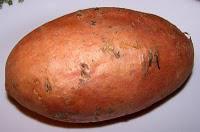
SUPER NUTRITIOUS FOOD: Sweet Potatoes
Sweet potatoes are rich in complex carbohydrates, dietary fiber, beta carotene (a vitamin A equivalent nutrient), vitamin C, and vitamin B6. In 1992, the Center for Science in the Public Interest compared the nutritional value of sweet potatoes to other vegetables. Considering fiber content, complex carbohydrates, protein, vitamins A and C, iron, and calcium, the sweet potato ranked highest in nutritional value. Orange-fleshed sweet potatoes may be one of nature's unsurpassed sources of beta-carotene. Several recent studies have shown the superior ability of sweet potatoes to raise our blood levels of vitamin A. It's important to have some fat in your sweet potato-containing meals if you want to enjoy the full beta-carotene benefits of this root vegetable. Recent research has shown that a minimum of 3-5 grams of fat per meal significantly increases our uptake of beta-carotene from sweet potatoes.There are a surprising number of nutrient categories responsible for the health benefits of this underappreciated tuber. Among these categories are antioxidants, anti-inflammatory nutrients, and blood sugar-regulating nutrients. Each category brings with it valuable health benefits. Recent research has shown that particularly when passing through our digestive tract, sweet potato cyanidins and peonidins and other color-related phytonutrients may be able to lower the potential health risk posed by heavy metals and oxygen radicals. That risk reduction is important not only for individuals at risk of digestive tract problems like irritable bowel syndrome or ulcerative colitis but for all persons wanting to reduce the potential risk posed by heavy metal residues (like mercury or cadmium or arsenic) in their diet. Anthocyanin and other color-related pigments in sweet potato are equally valuable for their anti-inflammatory health benefits. What's equally fascinating about color-related sweet potato phytonutrients is their impact on fibrinogen. Fibrinogen is one of the key glycoproteins in the body that is required for successful blood clotting. With the help of a coagulation factor called thrombin, fibronogen gets converted into fibrin during the blood clotting process. Balanced amounts of fibrinogen, thrombin and fibrin are a key part of the body's health and its ability to close off wounds and stop loss of blood.When choosing sweet potatoes in the store select sweet potatoes that are firm and do not have any cracks, bruises or soft spots. Avoid those that are displayed in the refrigerated section of the produce department since cold temperature negatively affects their taste. Sweet potatoes should be stored in a cool, dark and well-ventilated place, where they will keep fresh for up to ten days.From a nutrition standpoint, there are a number of good options for cooking sweet potatoes. Options include steaming, boiling, stir frying and baking. Steaming is probably the best option.
Information compiled byKeith PayneFunctional Strength Systems
References:http://en.wikipedia.org/wiki/Sweet_potato#cite_note-23#cite_note-23http://www.whfoods.com/genpage.php?tname=foodspice&dbid=64http://www.whfoods.com/genpage.php?tname=nutrientprofile&dbid=128Bengtsson A, Brackmann C, Enejder A et al. J Agric Food Chem. 2010 Oct 1. [Epub ahead of print] 2010. Failla ML, Thakkar SK and Kim JY. J Agric Food Chem. 2009 Nov 25;57(22):10922-7. 2009. Mei X, Mu TH and Han JJ.. J Agric Food Chem. 2010 Jun 23;58(12):7305-10. 2010. Mills JP, Tumuhimbise GA, Jamil KM et al. J Nutr. 2009 Jan;139(1):44-50. Epub 2008 Dec 3. 2009.
Diet & Weight Magazine
Author's Latest Articles
-
Powerlifting 101:
-
Pwelifting 101: Handler
-
On This Day in Strength History
-
On This Day in Strength History
